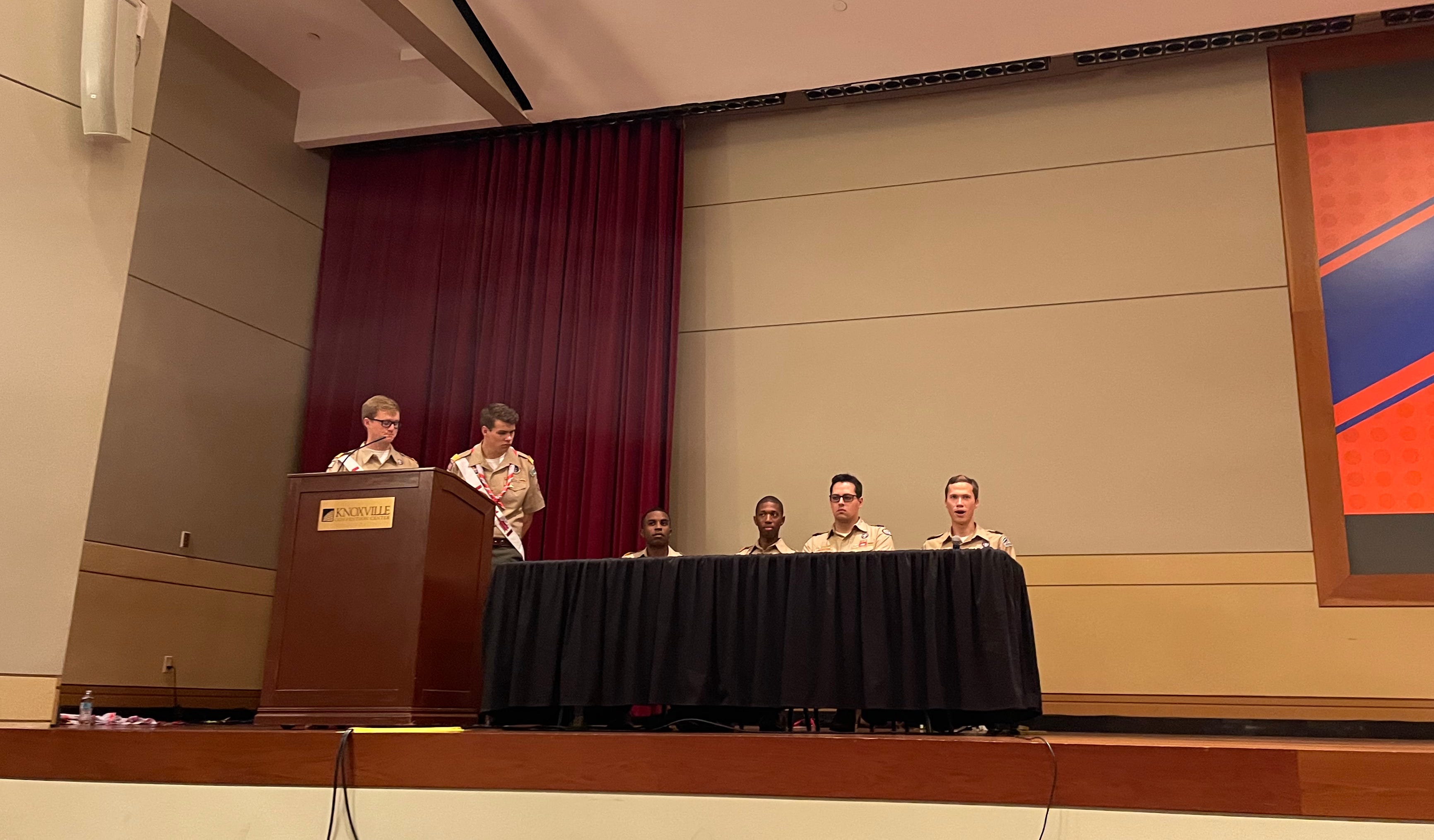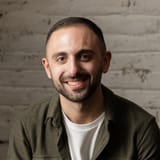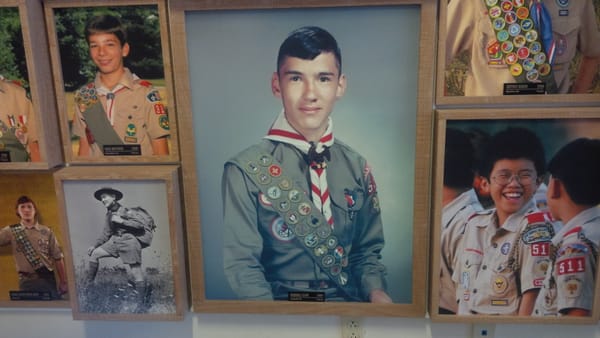A conversation with LGBTQ+ former national officers
Preston Marquis, Taylor Bobrow, Dwayne Fontenette and Zach Schonfeld shared their experiences during a panel discussion at the National Order of the Conference.
The reason depends on who you ask, and there is no shortage of speculation, but at the end of the day one thing is true: There have been many national officers in the Order of the Arrow that identify as LGBTQ.
For most of the OA’s history, these identities were hidden or, at most, an open secret. But thanks to the policy changes, many of these folks have been able to come out in recent years.
At the National OA conference, four LGBTQ-identifying former national officers sat down for a panel discussion — moderated by two of the current OA national officers.
I sat in on the conversation, and today I’m sharing some of the highlights for those of you couldn’t attend in person.

The first question came from Steven Buer, the current national vice chief, and it actually hit quite close to home. Buer asked Dwayne Fontenette, Jr., the 2011 southern region chief, to reflect on his experience publishing an op-ed in HuffPost in 2017 that shared his story as a queer scouter.
Many of you will remember that it was one of four essays, a series that I helped put together and that also included Alex Call and Ryan Jones. I’ve written extensively about how the experience of publishing these essays shaped me, but here was Fontenette’s take:
“The most powerful aspect of that, you all, was how many people flooded our inboxes, or cell phones, Facebook Messenger to say, ‘Hey, me too,’ right? ‘You are not alone in this program, I'm gay too, this meant a lot to me, or I truly support you. And I want our organization to change.’ And so it was by being visible, as more of us became visible, I think the culture slowly began to change. And as a result of a lot of other people, too — I don't intend to suggest that these articles changed the culture, but I think they contributed to the progress that we've seen,” he said.
Zach Schonfeld, the 2020 national chief and the youngest person on the panel, jumped in next:
“I was one of the ‘Oh, me too,’ people. And I didn't know Dwayne at the time. But I remember when those four op-eds came out, reading those. At the time, I was a lodge vice chief. But a few years later, when I served as national chief, I had made a decision in my mind that I basically had to choose one or the other, to either be my authentic self, or to be a national officer. I thought I couldn't be both. Now, a little bit later, I think I was wrong in thinking that, that I had to make that choice. And I regret not being in that mindset a little bit earlier. … We're seeing the culture change more and more each and every day. And and I hope that future officers don't have to make the choice that I thought I had to make, because I think it was a false mindset,” Schonfeld said.
The degree to which the culture of Scouting has changed was brought home by Preston Marquis, the 2012 national vice chief, who told the audience about the progress he’s seen since his term.
“In 2012, things were a lot different. There was no ArrowPride space, there was no Admonition Team. In fact, it was incredibly taboo to talk about these issues. … We have to be so grateful for all the progress we have made, because there have been so many who've come before us who have had to essentially live in secret or live in whispers. And that was definitely the case in 2012,” Marquis said.
He went on to share an anecdote from the 2012 conference, where Scouts for Equality tried to host a gathering of LGBTQ+ scouts and allies, only to have it almost entirely stamped out by BSA leadership.
“John Rehm, who was the chief, and I, we caught wind of where they were meeting one day and you know, we're 18, 19 year olds and curious, so what do we do? We go find the meeting location, and it's in … the basement of some arena at Michigan State University. And I think about how different things are. Where in 2012, we were literally skulking around to try to find the advocates for change. Whereas now we have this great space, this great community and our officers, the organization openly embrace these issues. I think it speaks to the need to — and I think Dwayne put it very well during his ribbon cutting for ArrowPride a couple of days ago — we have to be grateful for the progress that we've made, even as we continually work to preserve those gains and expand them. Because certainly, they are not automatic,” Marquis said.
Fontenette remembers well what it was like in 2012, too. He told the audience that, when the BSA publicly reaffirmed the ban on gay members that July (weeks before NOAC), he reached out to a friend in the program and said that he was going to leave Scouting.
“I don't want to have to choose between being me and being a scout. And so I'm gonna leave Scouting,” Fontenette recalls telling the friend. “And he said to me, ‘If everyone who shares our beliefs leaves, then things will never change.’ And that was helpful for me to hear at the time.”
When the panel began taking questions from the audience, the queries hewed almost entirely to practical matters.
“What happens tomorrow with this? We've had our event, what happens after the conference?” one audience member asked.
Fontenette, who leads the year-round diversity, equity and inclusion efforts for the OA, was eager to field this and other similar questions.
“The OA is leading the way on inclusivity in terms of national programs, because it's part of who we are as OA leaders. And the challenges ahead are, that we need to find ways to localize the work, right? To bring it close to scouts, most of the scouts are at the local level. And we need to find ways to inspire other national BSA programs to do the same. Because we can't be alone in it. It's not an OA thing. It's part of who we are as scouts,” Fontenette said. “In terms of localizing the work, part of that responsibility falls on you all, right? So you've seen some of the strategies that we've applied this week, in terms of increasing visibility, creating space for learning, etc. We need more councils to take initiative, so that we can elevate your best practices and share it with others.”
The next question from the audience: “What advice do you have for LGBT youth of today?”
Taylor Bobrow, the 2014 national vice chief, jumped in first for this one.
“I'd say most importantly to be yourself. I mean, to not be afraid to be yourself and to really trust in your brothers. … Everyone has your best interest in mind, and don't be afraid to be yourself.”
Fontenette added: “The other piece of advice [that] would have been helpful to me is to find your people. … You may not always know immediately where your allies might be, and who might share your identity. But by talking about your common values, your beliefs, reflecting on your spaces here, I think you might be able to find people who share your beliefs and identities. And it's through that community that I have found strength.”
That power of community came through in many of the following audience questions and answers. Schonfeld encouraged folks to think about the impact they could have on an individual level. “You as one person can make a world of difference for someone, even if the institution itself hasn't changed yet,” he said.
Fontenette also urged lodges to have more open conversations about what it means to “love one another,” and to use lodge and chapter meetings as opportunities to talk about the importance of inclusivity.
On a more personal level, one audience member asked, “When someone does come out, what's the best way to respond to make them feel comfortable and accepted?”
Schonfeld replied first to this one: “What I would say is, to a certain extent, just don't even overthink it. Because like I said before, for me it was sometimes the simplest responses of, ‘I have your back and I support you.’ And that's what meant the world to me. It didn't need to be, you know, some elaborate response or anything like that.”
And from Marquis: “I like to almost express gratitude, because this person is opening up to you and entrusting you potentially with something that may or may not be public knowledge. … And also just ask, ‘How can I help?’ Just to get a sense of where they are in their journey, and to hear them say, pretty directly, what it is that I can do to support them in living authentically.”
The next audience question also got back to practical matters: “Is there anything that you could say would be a number one call to action that [scouters] might be able to implement at the chapter or lodge level?”
"I think as advisors, particularly those of us in leadership positions, we have an obligation to ensure that our leadership teams not only espouse diverse values, but also look diverse and have that representation, because I think it's important for young people to be able to see themselves reflected in the leadership,” Marquis responded.
Fontenette agreed, giving an example of a lodge that is now requiring that every youth have two advisors, one male and one female. “That has exponentially increased the number of women who have access to leadership roles in their lodge,” he said.
Buer closed out the hour with a question that got to the heart of the entire discussion: “Scouting no longer has a ban on LGBTQ+ adults or youth. Everyone can be a scout, so why is it important to have conversations just like this one?”
Bobrow: “I really hope that we continue to grow the program, and by having these conversations we can hopefully diversify the populations that we're serving. And ultimately, I hope that every young person has the opportunity to and feels comfortable participating in Scouting.”
Marquis: “If we're not the ones with the mic, you never know what's going to come out of somebody else's mouth. So it's important for us to have these conversations and for us to go out and to shape the message of positivity about why these issues are important, because there are plenty of naysayers out there who would love nothing more than to take us backwards.”


